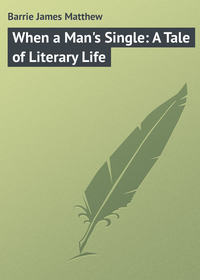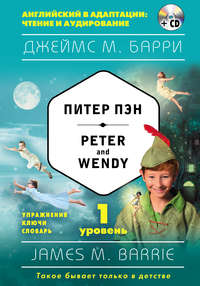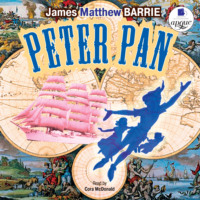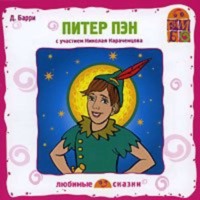 полная версия
полная версияThe Little Minister
“I allow,” Birse said, “that on the first Sabbath o’ June month, and again on the third Sabbath, he poured out the Word grandly, but I’ve ta’en note this curran Sabbaths that if he’s no michty magnificent he’s michty poor. There’s something damming up his mind, and when he gets by it he’s a roaring water, but when he doesna he’s a despizable trickle. The folk thinks it’s a woman that’s getting in his way, but dinna tell me that about sic a scholar; I tell you he would gang ower a toon o’ women like a loaded cart ower new-laid stanes.”
Wearyworld hobbled after me up the Roods one day, pelting me with remarks, though I was doing my best to get away from him. “Even Rob Dow sees there’s something come ower the minister,” he bawled, “for Rob’s fou ilka Sabbath now. Ay, but this I will say for Mr. Dishart, that he aye gies me a civil word,” I thought I had left the policeman behind with this, but next minute he roared, “And whatever is the matter wi’ him it has made him kindlier to me than ever.” He must have taken the short cut through Lunan’s close, for at the top of the Roods his voice again made up on me. “Dagone you, for a cruel pack to put your fingers to your lugs ilka time I open my mouth.”
As for Waster Lunny’s daughter Easie, who got her schooling free for redding up the school-house and breaking my furniture, she would never have been off the gossip about the minister, for she was her mother in miniature, with a tongue that ran like a pump after the pans are full, not for use but for the mere pleasure of spilling.
On that awful fourth of August I not only had all this confused talk in my head but reason for jumping my mind between it and the Egyptian (as if to catch them together unawares), and I was like one who, with the mechanism of a watch jumbled in his hand, could set it going if he had the art.
Of the gypsy I knew nothing save what I had seen that night, yet what more was there to learn? I was aware that she loved Gavin and that he loved her. A moment had shown it to me. Now with the Auld Lichts, I have the smith’s acquaintance with his irons, and so I could not believe that they would suffer their minister to marry a vagrant. Had it not been for this knowledge, which made me fearful for Margaret, I would have done nothing to keep these two young people apart. Some to whom I have said this maintain that the Egyptian turned my head at our first meeting. 220 Such an argument is not perhaps worth controverting. I admit that even now I straighten under the fire of a bright eye, as a pensioner may salute when he sees a young officer. In the shooting season, should I chance to be leaning over my dyke while English sportsmen pass (as is usually the case if I have seen them approaching), I remember nought of them save that they call me “she,” and end their greetings with “whatever” (which Waster Lunny takes to be a southron mode of speech), but their ladies dwell pleasantly in my memory, from their engaging faces to the pretty crumpled thing dangling on their arms, that is a hat or a basket, I am seldom sure which. The Egyptian’s beauty, therefore, was a gladsome sight to me, and none the less so that I had come upon it as unexpectedly as some men step into a bog. Had she been alone when I met her I cannot deny that I would have been content to look on her face, without caring what was inside it; but she was with her lover, and that lover was Gavin, and so her face was to me as little for admiring as this glen in a thunderstorm, when I know that some fellow-creature is lost on the hills.
If, however, it was no quick liking for the gypsy that almost tempted me to leave these two lovers to each other, what was it? It was the warning of my own life. Adam Dishart had torn my arm from Margaret’s, and I had not recovered the wrench in eighteen years. Rather than act his part between these two I felt tempted to tell them, “Deplorable as the result may be, if you who are a minister marry this vagabond, it will be still more deplorable if you do not.”
But there was Margaret to consider, and at thought of her I cursed the Egyptian aloud. What could I do to keep Gavin and the woman apart? I could tell him the secret of his mother’s life. Would that be sufficient? It would if he loved Margaret, as I did not doubt. Pity for her would make him undergo any torture rather 221 than she should suffer again. But to divulge our old connection would entail her discovery of me, and I questioned if even the saving of Gavin could destroy the bitterness of that.
I might appeal to the Egyptian. I might tell her even what I shuddered to tell him. She cared for him, I was sure, well enough to have the courage to give him up. But where was I to find her?
Were she and Gavin meeting still? Perhaps the change which had come over the little minister meant that they had parted. Yet what I had heard him say to her on the hill warned me not to trust in any such solution of the trouble.
Boys play at casting a humming-top into the midst of others on the ground, and if well aimed it scatters them prettily. I seemed to be playing such a game with my thoughts, for each new one sent the others here and there, and so what could I do in the end but fling my tops aside, and return to the heeling of my boot?
I was thus engaged when the sudden waking of the glen into life took me to my window. There is seldom silence up here, for if the wind be not sweeping the heather, the Quharity, that I may not have heard for days, seems to have crept nearer to the school-house in the night, and if both wind and water be out of earshot, there is the crack of a gun, or Waster Lunny’s shepherd is on a stone near at hand whistling, or a lamb is scrambling through a fence, and kicking foolishly with its hind legs. These sounds I am unaware of until they stop, when I look up. Such a stillness was broken now by music.
From my window I saw a string of people walking rapidly down the glen, and Waster Lunny crossing his potato-field to meet them. Remembering that, though I was in my stocking soles, the ground was dry, I hastened to join the farmer, for I like to miss nothing. I 222 saw a curious sight. In front of the little procession coming down the glen road, and so much more impressive than his satellites that they may be put of mind as merely ploughman and the like following a show, was a Highlander that I knew to be Lauchlan Campbell, one of the pipers engaged to lend music to the earl’s marriage. He had the name of a thrawn man when sober, but pretty at the pipes at both times, and he came marching down the glen blowing gloriously, as if he had the clan of Campbell at his heels. I know no man who is so capable on occasion of looking like twenty as a Highland piper, and never have I seen a face in such a blaze of passion as was Lauchlan Campbell’s that day. His following were keeping out of his reach, jumping back every time he turned round to shake his fist in the direction of the Spittal. While this magnificent man was yet some yards from us, I saw Waster Lunny, who had been in the middle of the road to ask questions, fall back in fear, and not being a fighting man myself, I jumped the dyke. Lauchlan gave me a look that sent me farther into the field, and strutted past, shrieking defiance through his pipes, until I lost him and his followers in a bend of the road.
“That’s a terrifying spectacle,” I heard Waster Lunny say when the music had become but a distant squeal. “You’re bonny at louping dykes, dominie, when there is a wild bull in front o’ you. Na, I canna tell what has happened, but at the least Lauchlan maun hae dirked the earl. Thae loons cried out to me as they gaed by that he has been blawing awa’ at that tune till he canna halt. What a wind’s in the crittur! I’m thinking there’s a hell in ilka Highlandman.”
“Take care then, Waster Lunny, that you dinna licht it,” said an angry voice that made us jump, though it was only Duncan, the farmer’s shepherd, who spoke.
“I had forgotten you was a Highlandman yoursel’, Duncan,” Waster Lunny said nervously; but Elspeth, 223 who had come to us unnoticed, ordered the shepherd to return to the hillside, which he did haughtily.
“How did you no lay haud on that blast o’ wind, Lauchlan Campbell,” asked Elspeth of her husband, “and speir at him what had happened at the Spittal? A quarrel afore a marriage brings ill luck.”
“I’m thinking,” said the farmer, “that Rintoul’s making his ain ill luck by marrying on a young leddy.”
“A man’s never ower auld to marry,” said Elspeth.
“No, nor a woman,” rejoined Waster Lunny, “when she gets the chance. But, Elspeth, I believe I can guess what has fired that fearsome piper. Depend upon it, somebody has been speaking disrespectful about the crittur’s ancestors.”
“His ancestors!” exclaimed Elspeth, scornfully. “I’m thinking mine could hae bocht them at a crown the dozen.”
“Hoots,” said the farmer, “you’re o’ a weaving stock, and dinna understand about ancestors. Take a stick to a Highland laddie, and it’s no him you hurt, but his ancestors. Likewise it’s his ancestors that stanes you for it. When Duncan stalked awa the now, what think you he saw? He saw a farmer’s wife dauring to order about his ancestors; and if that’s the way wi’ a shepherd, what will it be wi’ a piper that has the kilts on him a’ day to mind him o’ his ancestors ilka time he looks down?”
Elspeth retired to discuss the probable disturbance at the Spittal with her family, giving Waster Lunny the opportunity of saying to me impressively —
“Man, man, has it never crossed you that it’s a queer thing the like o’ you and me having no ancestors? Ay, we had them in a manner o’ speaking, no doubt, but they’re as completely lost sicht o’ as a flagon lid that’s fallen ahint the dresser. Hech, sirs, but they would need a gey rubbing to get the rust off them now. I’ve been thinking that if I was to get my laddies to say 224 their grandfather’s name a curran times ilka day, like the Catechism, and they were to do the same wi’ their bairns, and it was continued in future generations, we micht raise a fell field o’ ancestors in time. Ay, but Elspeth wouldna hear o’t. Nothing angers her mair than to hear me speak o’ planting trees for the benefit o’ them that’s to be farmers here after me; and as for ancestors, she would howk them up as quick as I could plant them. Losh, dominie, is that a boot in your hand?”
To my mortification I saw that I had run out of the school-house with the boot on my hand as if it were a glove, and back I went straightway, blaming myself for a man wanting in dignity. It was but a minor trouble this, however, even at the time; and to recall it later in the day was to look back on happiness, for though I did not know it yet, Lauchlan’s playing raised the curtain on the great act of Gavin’s life, and the twenty-four hours had begun, to which all I have told as yet is no more than the prologue.
Chapter Twenty-Six.
SCENE AT THE SPITTAL
Within an hour after I had left him, Waster Lunny walked into the school-house and handed me his snuff-mull, which I declined politely. It was with this ceremony that we usually opened our conversations.
“I’ve seen the post,” he said, “and he tells me there has been a queer ploy at the Spittal. It’s a wonder the marriage hasna been turned into a burial, and all because o’ that Highland stirk, Lauchlan Campbell.”
Waster Lunny was a man who had to retrace his steps in telling a story if he tried short cuts, and so my custom was to wait patiently while he delved through the ploughed fields that always lay between him and his destination.
“As you ken, Rintoul’s so little o’ a Scotchman that he’s no muckle better than an Englisher. That maun be the reason he hadna mair sense than to tramp on a Highlandman’s ancestors, as he tried to tramp on Lauchlan’s this day.”
“If Lord Rintoul insulted the piper,” I suggested, giving the farmer a helping hand cautiously, “it would be through inadvertence. Rintoul only bought the Spittal a year ago, and until then, I daresay, he had seldom been on our side of the Border.”
This was a foolish interruption, for it set Waster Lunny off in a new direction.
“That’s what Elspeth says. Says she, ‘When the earl has grand estates in England, what for does he come to a barren place like the Spittal to be married? 226 It’s gey like,’ she says, ‘as if he wanted the marriage to be got by quietly; a thing,’ says she, ‘that no woman can stand. Furthermore,’ Elspeth says, ‘how has the marriage been postponed twice?’ We ken what the servants at the Spittal says to that, namely, that the young lady is no keen to take him, but Elspeth winna listen to sic arguments. She says either the earl had grown timid (as mony a man does) when the wedding-day drew near, or else his sister that keeps his house is mad at the thocht o’ losing her place; but as for the young leddy’s being sweer, says Elspeth, ‘an earl’s an earl however auld he is, and a lassie’s a lassie however young she is, and weel she kens you’re never sure o’ a man’s no changing his mind about you till you’re tied to him by law, after which it doesna so muckle matter whether he changes his mind about you or no.’ Ay, there’s a quirk in it some gait, dominie; but it’s a deep water Elspeth canna bottom.”
“It is,” I agreed; “but you were to tell me what Birse told you of the disturbance at the Spittal.”
“Ay, weel,” he answered, “the post puts the wite o’t on her little leddyship, as they call her, though she winna be a leddyship till the morn. All I can say is that if the earl was saft enough to do sic a thing out of fondness for her, it’s time he was married on her, so that he may come to his senses again. That’s what I say; but Elspeth conters me, of course, and says she, ‘If the young leddy was so careless o’ insulting other folks’ ancestors, it proves she has nane o’ her ain; for them that has china plates themsel’s is the maist careful no to break the china plates of others.’”
“But what was the insult? Was Lauchlan dismissed?”
“Na, faags! It was waur than that. Dominie, you’re dull in the uptake compared to Elspeth. I hadna telled her half the story afore she jaloused the rest. However, to begin again; there’s great feasting and rejoicings gaen on at the Spittal the now, and also a banquet, 227 which the post says is twa dinners in one. Weel, there’s a curran Ogilvys among the guests, and it was them that egged on her little leddyship to make the daring proposal to the earl. What was the proposal? It was no less than that the twa pipers should be ordered to play ‘The Bonny House o’ Airlie.’ Dominie, I wonder you can tak it so calm when you ken that’s the Ogilvy’s sang, and that it’s aimed at the clan o’ Campbell.”
“Pooh!” I said. “The Ogilvys and the Campbells used to be mortal enemies, but the feud has been long forgotten.”
“Ay, I’ve heard tell,” Waster Lunny said sceptically, “that Airlie and Argyle shakes hands now like Christians; but I’m thinking that’s just afore the Queen. Dinna speak now, for I’m in the thick o’t. Her little leddyship was all hinging in gold and jewels, the which winna be her ain till the morn; and she leans ower to the earl and whispers to him to get the pipers to play ‘The Bonny House.’ He wasna willing, for says he, ‘There’s Ogilvys at the table, and ane o’ the pipers is a Campbell, and we’ll better let sleeping dogs lie.’ However, the Ogilvys lauched at his caution; and he was so infatuated wi’ her little leddyship that he gae in, and he cried out to the pipers to strike up ‘The Bonny House.’”
Waster Lunny pulled his chair nearer me and rested his hand on my knees.
“Dominie,” he said in a voice that fell now and again into a whisper, “them looking on swears that when Lauchlan Campbell heard these monstrous orders his face became ugly and black, so that they kent in a jiffy what he would do. It’s said a’ body jumped back frae him in a sudden dread, except poor Angus, the other piper, wha was busy tuning up for ‘The Bonny House.’ Weel, Angus had got no farther in the tune than the first skirl when Lauchlan louped at him, and ripped 228 up the startled crittur’s pipes wi’ his dirk. The pipes gae a roar o’ agony like a stuck swine, and fell gasping on the floor. What happened next was that Lauchlan wi’ his dirk handy for onybody that micht try to stop him, marched once round the table, playing ‘The Campbells are Coming,’ and then straucht out o’ the Spittal, his chest far afore him, and his head so weel back that he could see what was going on ahint. Frae the Spittal to here he never stopped that fearsome tune, and I’se warrant he’s blawing away at it at this moment through the streets o’ Thrums.”
Waster Lunny was not in his usual spirits, or he would have repeated his story before he left me, for he had usually as much difficulty in coming to an end as in finding a beginning. The drought was to him as serious a matter as death in the house, and as little to be forgotten for a lengthened period.
“There’s to be a prayer-meeting for rain in the Auld Licht kirk the night,” he told me as I escorted him as far as my side of the Quharity, now almost a dead stream, pitiable to see, “and I’m gaen; though I’m sweer to leave thae puir cattle o’ mine. You should see how they look at me when I gie them mair o’ that rotten grass to eat. It’s eneuch to mak a man greet, for what richt hae I to keep kye when I canna meat them?”
Waster Lunny has said to me more than once that the great surprise of his life was when Elspeth was willing to take him. Many a time, however, I have seen that in him which might have made any weaver’s daughter proud of such a man, and I saw it again when we came to the river side.
“I’m no ane o’ thae farmers,” he said, truthfully, “that’s aye girding at the weather, and Elspeth and me kens that we hae been dealt wi’ bountifully since we took this farm wi’ gey anxious hearts. That woman, dominie, is eneuch to put a brave face on a coward, and 229 it’s no langer syne than yestreen when I was sitting in the dumps, looking at the aurora borealis, which I canna but regard as a messenger o’ woe, that she put her hand on my shoulder and she says, ‘Waster Lunny, twenty year syne we began life thegither wi’ nothing but the claethes on our back, and an it please God we can begin it again, for I hae you and you hae me, and I’m no cast down if you’re no.’ Dominie, is there mony sic women in the warld as that?”
“Many a one,” I said.
“Ay, man, it shamed me, for I hae a kind o’ delight in angering Elspeth, just to see what she’ll say. I could hae ta’en her on my knee at that minute, but the bairns was there, and so it wouldna hae dune. But I cheered her up, for, after all, the drought canna put us so far back as we was twenty years syne, unless it’s true what my father said, that the aurora borealis is the devil’s rainbow. I saw it sax times in July month, and it made me shut my een. You was out admiring it, dominie, but I can never forget that it was seen in the year twelve just afore the great storm. I was only a laddie then, but I mind how that awful wind stripped a’ the standing corn in the glen in less time than we’ve been here at the water’s edge. It was called the deil’s besom. My father’s hinmost words to me was, ‘It’s time eneuch to greet, laddie, when you see the aurora borealis.’ I mind he was so complete ruined in an hour that he had to apply for relief frae the poor’s rates. Think o’ that, and him a proud man. He would tak’ nothing till one winter day when we was a’ starving, and syne I gaed wi’ him to speir for’t, and he telled me to grip his hand ticht, so that the cauldness o’ mine micht gie him courage. They were doling out the charity in the Town’s House, and I had never been in’t afore. I canna look at it now without thinking o’ that day when me and my father gaed up the stair thegither. Mr. Duthie was presiding at the time, and he wasna 230 muckle older than Mr. Dishart is now. I mind he speired for proof that we was needing, and my father couldna speak. He just pointed at me. ‘But you have a good coat on your back yoursel’,’ Mr. Duthie said, for there were mony waiting, sair needing. ‘It was lended him to come here,’ I cried, and without a word my father opened the coat, and they saw he had nothing on aneath, and his skin blue wi ’cauld. Dominie, Mr. Duthie handed him one shilling and saxpence, and my father’s fingers closed greedily on’t for a minute, and syne it fell to the ground. They put it back in his hand, and it slipped out again, and Mr. Duthie gave it back to him, saying, ‘Are you so cauld as that?’ But, oh, man, it wasna cauld that did it, but shame o’ being on the rates. The blood a’ ran to my father’s head, and syne left it as quick, and he flung down the siller and walked out o’ the Town House wi’ me running after him. We warstled through that winter, God kens how, and it’s near a pleasure to me to think o’t now, for, rain or no rain, I can never be reduced to sic straits again.”
The farmer crossed the water without using the stilts which were no longer necessary, and I little thought, as I returned to the school-house, what terrible things were to happen before he could offer me his snuff-mull again. Serious as his talk had been it was neither of drought nor of the incident at the Spittal that I sat down to think. My anxiety about Gavin came back to me until I was like a man imprisoned between walls of his own building. It may be that my presentiments of that afternoon look gloomier now than they were, because I cannot return to them save over a night of agony, black enough to darken any time connected with it. Perhaps my spirits only fell as the wind rose, for wind ever takes me back to Harvie, and when I think of Harvie my thoughts are of the saddest. I know that I sat for some hours, now seeing Gavin pay the penalty 231 of marrying the Egyptian, and again drifting back to my days with Margaret, until the wind took to playing tricks with me, so that I heard Adam Dishart enter our home by the sea every time the school-house door shook.
I became used to the illusion after starting several times, and thus when the door did open, about seven o’clock, it was only the wind rushing to my fire like a shivering dog that made me turn my head. Then I saw the Egyptian staring at me, and though her sudden appearance on my threshold was a strange thing, I forgot it in the whiteness of her face. She was looking at me like one who has asked a question of life or death, and stopped her heart for the reply.
“What is it?” I cried, and for a moment I believe I was glad she did not answer. She seemed to have told me already as much as I could bear.
“He has not heard,” she said aloud in an expressionless voice, and, turning, would have slipped away without another word.
“Is any one dead?” I asked, seizing her hands and letting them fall, they were so clammy. She nodded, and trying to speak could not.
“He is dead,” she said at last in a whisper. “Mr. Dishart is dead,” and she sat down quietly.
At that I covered my face, crying, “God help Margaret!” and then she rose, saying fiercely, so that I drew back from her, “There is no Margaret; he only cared for me.”
“She is his mother,” I said hoarsely, and then she smiled to me, so that I thought her a harmless mad thing. “He was killed by a piper called Lauchlan Campbell,” she said, looking up at me suddenly. “It was my fault.”
“Poor Margaret!” I wailed.
“And poor Babbie,” she entreated pathetically; “will no one say, ‘Poor Babbie’?”
Chapter Twenty-Seven.
FIRST JOURNEY OF THE DOMINIE TO THRUMS DURING THE TWENTY-FOUR HOURS
“How did it happen?” I asked more than once, but the Egyptian was only with me in the body, and she did not hear. I might have been talking to some one a mile away whom a telescope had drawn near my eyes.
When I put on my bonnet, however, she knew that I was going to Thrums, and she rose and walked to the door, looking behind to see that I followed.
“You must not come,” I said harshly, but her hand started to her heart as if I had shot her, and I added quickly, “Come.” We were already some distance on our way before I repeated my question.
“What matter how it happened?” she answered piteously, and they were words of which I felt the force. But when she said a little later, “I thought you would say it is not true,” I took courage, and forced her to tell me all she knew. She sobbed while she spoke, if one may sob without tears.
“I heard of it at the Spittal,” she said. “The news broke out suddenly there that the piper had quarrelled with some one in Thrums, and that in trying to separate them Mr. Dishart was stabbed. There is no doubt of its truth.”











